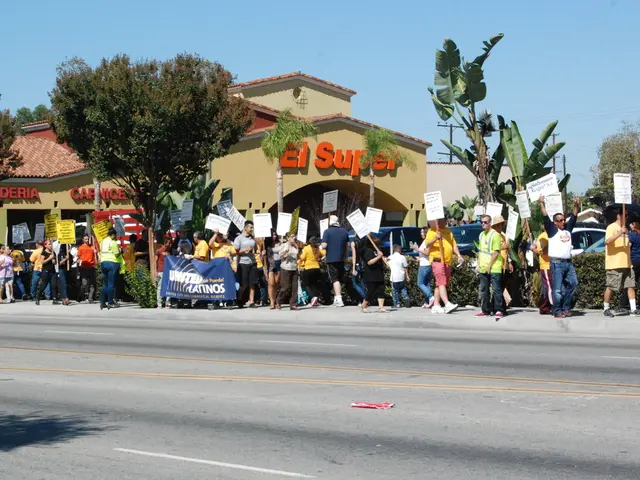Google Challenges South Africa's Accusations of Excessive Profits from Local Newspaper Providers
The Competition Commission of South Africa is currently engaged in a provisional Media and Digital Platforms Market Inquiry (MDPMI), aimed at addressing concerns about digital platforms and their impact on markets such as local news.
The MDPMI, which began in 2023, aims to address anticompetitive conduct, unfair treatment of business users, barriers to entry, and to promote fair competition, including for smaller local content providers and historically disadvantaged groups.
One of the key points of contention in the investigation is Google's dominance in search. The commission accuses Google of unfairly impacting the media industry through its dominance, particularly with "zero-click" searches. This allegation suggests that Google's search features are causing a reduction in web traffic and ad revenue for media houses.
Google, however, disputes these claims. The tech giant asserts that it supports publishers by driving traffic to their sites and investing in tools and training. Google's platforms generated approximately R350 million ($18 million) worth of referral traffic for South African publishers in 2023.
Khusela Sangoni Diko, chairperson of the Portfolio Committee on Communication and Digital Technologies, supports the commission's recommendations. Diko believes these proposals could drive reforms, including a new media policy requiring digital platforms to compensate news publishers. The commission recommends that Google pay R500 million ($26 million) annually to local publishers.
The South African Competition Commission's investigation is part of a broader intensified scrutiny of big tech companies. Related antitrust actions against Google internationally—such as a landmark U.S. ruling in April 2025—highlight Google's monopolistic behavior in digital advertising technology, which impacts publisher revenues worldwide, including news outlets. These global developments could influence or inform South Africa’s regulatory approach.
As of August 2025, no specific recent publicly reported update on an investigation solely focusing on Google's revenue sharing or practices regarding local news publishers in South Africa has been made. However, the ongoing MDPMI and global momentum suggest that this area remains under active consideration rather than finalized.
The battle between the South African Competition Commission and Google over the tech giant's business practices in the country is far from over. Google is currently reviewing the commission's findings before providing a full response. Diko's support for the commission's recommendations could potentially influence the development of a new media policy in South Africa, which could require digital platforms like Google and YouTube to compensate news publishers for the content from which they benefit.
The ongoing MDPMI investigation by the South African Competition Commission, regarding Google's dominance in search and its possible impact on local news businesses, involves issues of anticompetitive conduct and fair competition in the broader field of technology business and finance. The commission's recommendations, including an annual payment of R500 million by Google to local publishers, reflect a growing interest in politics and policy surrounding the relationship between digital platforms, such as Google and YouTube, and the media industry. These developments in South Africa are part of a global trend of increased scrutiny of tech companies in the realm of digital advertising technology, particularly due to antitrust actions in politics and general-news arenas internationally.




